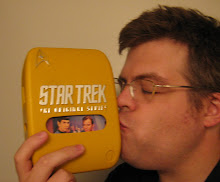
I have 142 unread books on my shelves. And that doesn't include comics.
I am not proud of this, I only mention it because with only one Hugo novel left on my agenda I'm now tucking in to what I estimate at three years to read my own modest library. Faster if TV continues to be its usual monotonous drivel. Thundercats, indeed!
What happened to the nearsighted, antisocial boy I was who devoured books like it was going out of style?
It's books for me from here on out, yessir!
(Don't mind me, TV, nothing to see here.)
First up from a favorite author of mine, was 'The Green Hills of Earth', copyright 1951, by Robert Heinlein, a collection of some of his short stories. It's a swell book, and in no danger of leaving my library for trade value or donation.
Heinlein drew up a timeline to keep all his sci-fi stories straight, and it's included with most of his works. Good old uncle Robert postulated the half century between 1950 & 2000 as interplanetary expansionist, with thriving human colonies on the moon, Mars, & Venus, pioneering the mighty void of space with courage despite many grave accidents and disasters.
His future world is one of personal helicopters for all, and women dressed in six ounces of fabric! All very well, but those two elements alone seem designed for trouble:

 (helicopter engine): wuwbwuwbwuwb...
(helicopter engine): wuwbwuwbwuwb...Jones: Zowie, Harriman, how 'bout the propellant tanks on her?
Harriman: Hoo, hoo! I bet a dame like that would... LOOK OUT!
(helicopter collides with 3 other helicopters, explodes): KRAKABOOM.
Speaking of women turning heads, the first story in the collection; 'Delilah and the Space Rigger' takes a light-headed look at sexism in the space workplace. I maintain that although space stations aren't as commonplace as Heinlein hoped, he knew a metric crapload about how people behaved and still behave today. He saw the sexual revolution coming a mile off, and either regarded it as a change in everyone's best interests or knew womenfolk are impossible to hold back. If our kind goes out there, it'll be two by two, or at least shoulder to shoulder.
In 'The Long Watch' and 'The Green Hills of Earth' brave spacemen die horrible and heroic deaths by radiation to save their fellows. So far, there hasn't been much of this outside sci-fi, either. No atomic-powered spaceships means no blind accordion playing space jockeys. Knock on wood. Also commercial space travel is 60 years behind Heinlein's projections and is still little more than a novelty for the ultra-rich. But on the bright side, we don't have indentured slaves dying of fungal infections in the swamps of Venus, either. Well, maybe NEXT century. As long as we engineer the fungus ourselves, and also bring the swamps and slaves with us.
'We Also Walk Dogs' featured a global interconnected telephonic company called General Services whose multitudinous employees offer nearly anything, at tremendous speed, for a price. It may not be organized and driven enough to provoke reclusive scientists into spontaneously generating anti-gravity (as in this tale), but we've got that very connective technology these days. And, who knows? Link enough blogs together, sift through the gibberish and the porn, and, just imagine what all of us might think of... together!

Just keep your eyes on the skies when you're flying your cars, brothers.

No comments:
Post a Comment